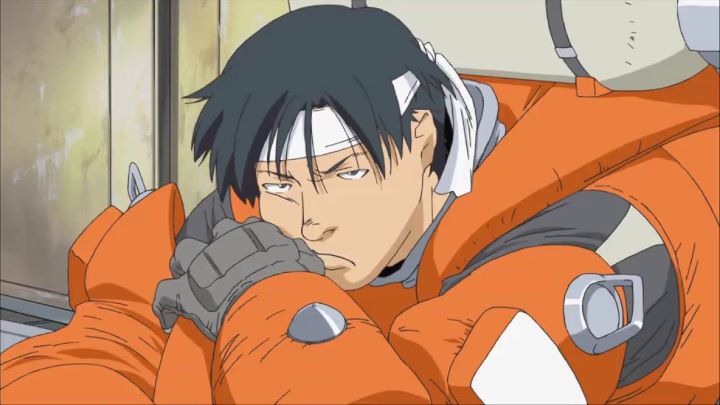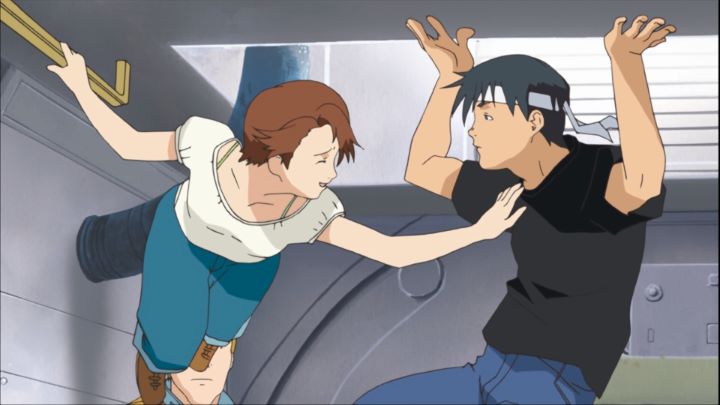






I watch a lot of Japanese anime, but I don't read a lot of manga. Curiously, what manga I have read leads me to believe Japanese comics to be weaker than just about any country, but that's a whole other discussion. The first manga book I ever picked up was, in all places, inside my high school's small library: volume 1 of "Planetes," one of only a handful of comic books on the shelf. Considered a modern classic today, the series is set about a century into the future, when space exploration and migration is much more common, focusing on a team of "space debris" collectors. Pieces of debris have cluttered up space, particularly around Earth's atmosphere, and without gravity to slow it down, even a missing screw can be life-threatening to astronauts when it hurtles hundreds of miles an hour. The "garbage collectors" of space have an important job, regardless of how small it may seem. The manga excels in telling human stories that expand this near-future world, both from a grounded scientific point of view, and a psychological one.When an anime based on a manga is prepared, it usually overtakes popularity for the franchise. And yet, the anime of "Planetes" is overlooked. Originally dubbed and released by Bandai Entertainment (and after their bankruptcy, remaining out of print on DVD as of 2019), I wouldn't be surprised if you didn't know the anime existed. After the first few episodes of the show, it's clear why: it hasn't aged well, and it makes specific writing decisions that take away from what the manga was known for. Even so, the best of the story remains in the anime, in one form or another.The biggest issue with the anime is that it immediately focuses on the characters, rather than the various stories. At least, at first; the writers probably thought the stories would have more impact if a recognizable character could guide us through it. Tanabe is a bright-eyed new employee of the space company Technora, but she gets placed in the "Space Debris Section" in the basement. The group is understaffed, earning the demeaning nickname "half-section" by the rest of the company, and the employees there are... eccentric. "Hachimaki" becomes her mentor, and his brash attitude doesn't make a good first impression. The setup feels like "Office Space" in... space. The comedy isn't particularly funny. Not surprisingly, Tanabe and Hachimaki ultimately fall in love by the half-way point of the series, but I was annoyed with how forced that unnaturally relationship felt. Most of the "core" plotlines are designed around traditional Japanese company layouts (despite an otherwise international vibe from the cast): hierarchy counts for everything, sub-section politics makes everything more difficult than it should be, managers are almost always incompetent and played for laughs, and experienced co-workers vary wildly in personalities. Having worked at real companies like this, it hits a little too close to home how difficult such companies can be. And frankly, it comes across as a little boring, especially for 26 episodes.But thankfully, the strength of the manga shows up soon enough. The modern business and tourism of space travel is incredibly well imagined, as is the human element. There are stories about people who were born in space, never having seen the Earth for themselves. Astronauts die often, either due to accidents or radiation exposure. Only first-world countries can afford to build equipment for space, and the distance between them and poorer countries grows ever furhter, causing conflict. Even with the annoying crew of Debris section acting as the audience's guide through these stand-alone episodes, the writing is fascinating, similar to anthology series like 'MushiShi" or "Kino's Journey," encouraging a sense of wonder. The second half of the series focuses heavily on a large arc, involving Hachimaki training to join a 7-year space expedition, and a terrorist group trying to force humans back to Earth. I was impressed with the payoff these arc introduces, leaning on all the seemingly inconsequential episodes before it, and containing some impressive writing and character development on its own. Logic stumbles a little in favor of creating drama, but I was willing to overlook it. "Planetes" has great sci-fi writing.Watching the series over a decade from it's initial release, I cringed a little. This is definitely an example of early digi-paint and its limitations. Animation is fairly static almost throughout, and character designs are flat and unappealing. I gave the visuals a small bump because of the respect I have to the detail of the world and the environment. For example, in zero-gravity, handle bars are placed along the floors, walls and ceiling, where employees typically hook their feet as they float down the hallway. It's those little details that make "Planetes" feel more than just another sci-fi anime of pretty characters in prestine clean suits. The music is fine, but the iconic male chant was a little annoying over time. The English dub is similar; it's good, but more annoying than it should be (and hearing them constantly exclaim "Cheng-Shin!" (pronounced "Chin Shin") dozens of times throughout the series made me want to tear my ears off). One of the more curious bonus features on Bandai's DVD set was audio commentaries from the Japanese voice cast, for several of the episodes; a rare bonus, and actually entertaining, thanks in part for the cast's encouragement to drink while recording these interviews.So "Planetes" is certainly good, and it's more grounded story helps a lot to make it stand out from typical science-fiction anime. But it takes a while to get going, and the weak production values make it difficult to convince someone to stay with it long enough to get to the best parts. In 2019, there's a renewed interest in space exploration, with private companies promising to send tourists to the moon within a decade. The themes present here have never been more relavent, and it's prediction of what 2075 will look like might not be far off. I do wonder if a modern reboot, perhaps as a single feature film or OVA, would be worth the effort... or maybe I would recommend just reading the manga.
The second half of the series focuses heavily on a large arc, involving Hachimaki training to join a 7-year space expedition, and a terrorist group trying to force humans back to Earth. I was impressed with the payoff these arc introduces, leaning on all the seemingly inconsequential episodes before it, and containing some impressive writing and character development on its own. Logic stumbles a little in favor of creating drama, but I was willing to overlook it. "Planetes" has great sci-fi writing.Watching the series over a decade from it's initial release, I cringed a little. This is definitely an example of early digi-paint and its limitations. Animation is fairly static almost throughout, and character designs are flat and unappealing. I gave the visuals a small bump because of the respect I have to the detail of the world and the environment. For example, in zero-gravity, handle bars are placed along the floors, walls and ceiling, where employees typically hook their feet as they float down the hallway. It's those little details that make "Planetes" feel more than just another sci-fi anime of pretty characters in prestine clean suits. The music is fine, but the iconic male chant was a little annoying over time. The English dub is similar; it's good, but more annoying than it should be (and hearing them constantly exclaim "Cheng-Shin!" (pronounced "Chin Shin") dozens of times throughout the series made me want to tear my ears off). One of the more curious bonus features on Bandai's DVD set was audio commentaries from the Japanese voice cast, for several of the episodes; a rare bonus, and actually entertaining, thanks in part for the cast's encouragement to drink while recording these interviews.So "Planetes" is certainly good, and it's more grounded story helps a lot to make it stand out from typical science-fiction anime. But it takes a while to get going, and the weak production values make it difficult to convince someone to stay with it long enough to get to the best parts. In 2019, there's a renewed interest in space exploration, with private companies promising to send tourists to the moon within a decade. The themes present here have never been more relavent, and it's prediction of what 2075 will look like might not be far off. I do wonder if a modern reboot, perhaps as a single feature film or OVA, would be worth the effort... or maybe I would recommend just reading the manga.